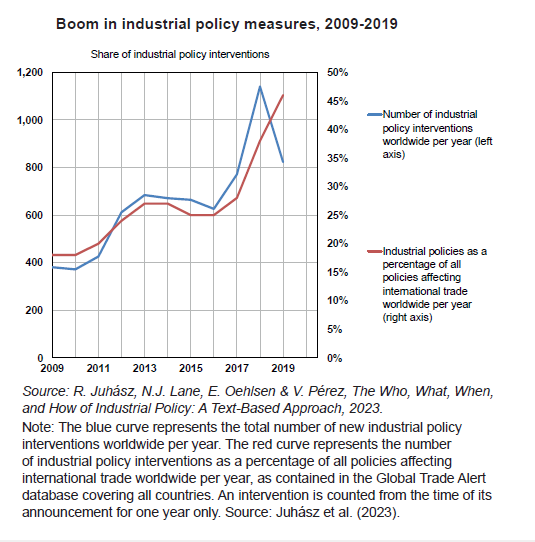Lessons from Past Industrial Policies
International industrial policy takeaways since 1945 suggest that the identification of market opportunities, competition between players and technology options, and maintaining high performance standards are important factors for success. In France, industrial policy stands out for the significance of vertical interventions and the focus on a small number of large firms.
Industrial policies aimed at the creation and development of specific sectors have made a comeback against a backdrop of a mounting number of crises, trade tensions, an accelerating innovation race and the imperative of combating climate change (see Chart on cover page). A study of policies in eight advanced and catching-up countries from 1945 to 2000 provides useful insight into the conditions determining their success or failure.
Industrial policy had similar aims in all countries studied: (i) growth and competitiveness; (ii) support for major transitions (energy, space, etc.); (iii) strategic autonomy and sovereignty; and (iv) support for declining sectors.
Although different models of industrial policy exist, most countries have intervened in a targeted manner in specific sectors. The catching-up countries (Japan followed by South Korea and China), France and the United Kingdom – up to the 1980s – directly intervened in the development of industrial production capacities. In the United States, sector measures were decentralised and limited to R&D support and government procurement in military and high value-added sectors.
The advanced countries’ sector-specific measures focused on emerging sectors with high stakes in defence- and sovereignty (aviation, energy and space in the post-war period followed, as in the catching-up countries, by electronics and IT). The catching-up countries initially focused on mature, but high-growth-potential mid-tech sectors (automobiles, chemicals and shipbuilding) and then on high-tech sectors (primarily electronics and IT).
International sector-specific industrial policy experiences provide useful insight for shaping today’s policies. For example, the success of both export aid conditional on performance in South Korea and the precise specification of ambitious technological goals in US development contracts suggests that setting high commercial and technological performance targets is a factor for success.
